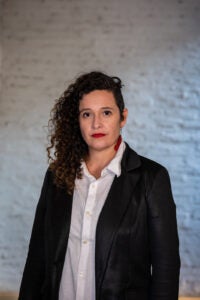When Natália Viana received the news that she had won the 2025 Maria Moors Cabot Prize Gold Medal, awarded by Columbia Journalism School, her initial reaction was surprise. Not only because of the honor itself, but because of what it represented: recognition extending beyond the mainstream media to a journalist who built her career through independent reporting.

Natália Viana founded Agência Pública with Marina Amaral in 2011. (Photo: Courtesy Natália Viana)
For her, the award represents more than personal recognition. It's confirmation that independent Brazilian journalism has earned its place on the international stage and that there's a future for those who dare to experiment and innovate, even facing all the limitations of resources and recognition that come with this press model.
"Here in Brazil, winners are traditionally people linked to the more traditional press, especially large media outlets. So, Assis Chateaubriand [founder of media conglomerate Diários Associados] won, Roberto Marinho [founder of Grupo Globo], but even among the more recent names, you have people who have always worked within structured organizations with a lot of resources," Viana told LatAm Journalism Review (LJR). "I think this journalism being recognized, and especially recognized in Brazil, a country that has seen an explosion of quality, independent journalism in the last 10 years, is a milestone. I'm very happy."
Viana's career illustrates the transformations Brazilian journalism has undergone in recent decades. In 2011, together with Marina Amaral, she co-founded Agência Pública, Brazil's first nonprofit investigative journalism agency, guided by public interest and the defense of human rights. Pública's creation coincided with Viana’s coverage of the Cablegate scandal, U.S. diplomatic communications disseminated via the WikiLeaks organization. This experience served as the impetus for launching the agency, which had its first major collaboration and reached an initial milestone as part of that project.
"I've never worked for a major media outlet, only as a freelancer or correspondent. And at Pública, as an almost heroic effort by a group of journalists working within all the limitations of being an independent organization," Viana said. "And there are several, it's not just money. In the early days of Pública, no one knew our name; we had to prove ourselves. Every job was twice as much work."
Innovation and experimentation
Viana's work at Pública has yielded investigations that have had a profound impact on the political and social landscape in Brazil and Latin America. Among the most important, she highlights a series on the impeachment of Paraguayan President Fernando Lugo in 2012, a finalist for the Gabo Award in 2013, and the investigation into Indigenous suicides in the Rio Negro, "São Gabriel e seus Demônios," published in 2015 and winner of the Gabo Award in 2016. She also reported the "Efeito Colateral" series on the murders of civilians by military personnel and the "Vaza-Jato" series on irregularities in the investigation of the massive corruption scandal known as Operation Car Wash. She’s currently working on a reporting series on big tech.
Beyond the reporting itself, Viana also highlighted the importance of experimentation as a central pillar of Pública's work. She mentioned projects like Truco, the agency's fact-checking project between 2014 and 2018, and digital storytelling innovations over the past decade.
"Within Pública, there were a lot of things that weren't exactly about reporting, but about the way of doing things. There was a moment, especially between 2011 and 2016, 2017, when things started to get really grim in Brazil, when there was a lot of room for experimentation," she said. "It was a very rich period, and it shaped me, because I've always believed that you can't stay stuck in a formula; you always need to test new things and have the curiosity to try new things. I think this possibility also left a deep mark on Pública, as a space where people actually experiment."
The Cabot Prize jury highlighted Viana as the kind of journalist our times demand: a reporter, editor, storyteller and mentor to new generations.
“Above all, she is an entrepreneur who has built digital-native investigative media outlets to expose power and its inner workings in an era overwhelmed by disinformation,” the jury said.
More than a decade at the helm of Pública taught Viana lessons that go beyond journalism. She said she learned to be a boss, to manage people and to think more strategically. But the most important lesson about journalism, she said, concerns the future of the profession. Viana believes journalism needs to undergo profound changes to survive.
"Journalism is in a moment of such profound change that, in order to save it in the future, we have to recreate every stage of journalism, every process, everything," she said. "It's not just that we're going to stop publishing in print and publish online. We have to redesign how a newsroom works. We need to redesign how we think about a story, we need to redesign what the role of the reporter is and what the reporter has to do with the person who disseminates the story."
The Maria Moors Cabot Prize, established in 1938, recognizes professionals with exceptional careers covering the Americas. The award ceremony will be held on Oct. 8, 2025, at Columbia University in New York. This year’s Gold Medal winners also include Omaya Sosa Pascual, co-founder of the Center for Investigative Journalism (CPI) in Puerto Rico; Nora Gámez Torres, correspondent for the Miami Herald and El Nuevo Herald; and Mexican journalist Isabella Cota of the International Consortium of Investigative Journalists (ICIJ). Special citations were awarded to Peruvian investigative journalist Paola Ugaz and Gabo Foundation co-founder Jaime Abello Banfi.
*Rosental Alves, director of the Knight Center for Journalism in the Americas, which publishes LatAm Journalism Review (LJR), is chair of the Cabot Jury.